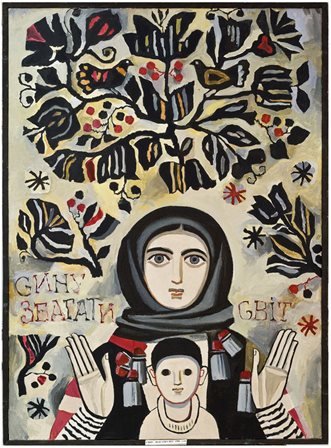Peacemaking in Wartime
A Response to the War in Ukraine
March 1, 2022 by J. Heinrich Arnold
Why do the nations rage and the peoples plot in vain?” asked the Psalmist three thousand years ago (Ps. 2:1). In today’s terms: Why did Vladimir Putin’s Russia invade Ukraine in an act of war unlike anything seen in Europe for seventy-seven years? What should be done: what military action, what sanctions, what war crimes charges?
Those are not questions for me to answer. The answers that a Christian pastor gives should point men and women towards Christ, and to call them to become what Jesus spoke of as “peacemakers,” who, he said in the Sermon on the Mount, “will be called the sons of God” (Matt. 5:9) .
Son, Make the World Better Place, 1988 – Ivan-Valentyn Zadorozhny. The artist was born on July 7, 1921 in Rzhyshchiv, Ukraine.
It is now urgent that we pour ourselves into the task of becoming peacemakers, of fashioning peace out of war.
A peacemaker will tell the truth: he or she will be bold in naming evil. Russia’s attack on a sovereign state, and particularly on civilians, must be unequivocally condemned, and we must stand with the Ukrainian people by refusing to let this invasion be called anything other than what it is.
However, words alone do not make peace. Peace is not a virtue that can be signaled. It must be built by actions of love.
The undaunted spirit of the Ukrainian resistance, and President Zelensky’s call to supporters abroad to pick up arms and fight the Russian military as part of Ukraine’s International Brigade, have inspired many. As Christians, we too feel the call to put one’s life on the line for the sake of others, to “lay down one’s life for one’s friends” as Jesus taught.
But how are we to use this drive? What action should this impulse lead us to? I belong to a historic peace church, committed to Christian nonviolence for over a century. We would die to protect those in harm’s way, but we believe that we may not kill to do so: we may not be those who take up arms.
According to Jesus’ teachings, actions of peace stem from love. Jesus’ love is unconditional. He directs actions of love and compassion first to the poor, the helpless, and weak, but demands the same even for our enemies. This is the hardest, and arguably the most important part of being a peacemaker.
We can take action by contributing humanitarian aid to victims of this war, by giving hospitality to refugees, and by supporting organizations such as Save the Children and Samaritan’s Purse, whose work in these areas is remarkable. As citizens, we can call for de-escalation, especially in light of the potential for a nuclear war that would leave the world a desert.
The most powerful action of peacemaking is prayer. We must pray for peace. We must join our voices with those of God’s people in Ukraine, in the NATO states, in Russia, and around the world to call on God to end this horror.
We do not pretend not to have enemies, but we know what Jesus tells us to do for our enemies: we must love them and pray for them. We must pray for God’s kingdom of peace to come to this earth, as it is in heaven. We must believe in the power of that prayer.
My great-grandfather, the German theologian Eberhard Arnold, learned peacemaking through experiencing World War I and then the Third Reich’s warmongering before World War II (he died in 1935). He founded the Bruderhof community with a vision for living out a life of peace and justice based on the way of life that Jesus taught in the Sermon on the Mount. Eberhard Arnold wrote the following about the power of prayer to affect international politics:
If our prayer is genuine, if we really want nothing but the kingdom of God, then we will think of all the regions of the world. We will call on God to intervene in the history of the nations, the history of classes and ranks, the history that has brought injustice to a climax. We will call on him to come with his judgment and to let his righteousness and peace break in like the dawn. This should be our prayer and the prayer of the church. Let us come to God in the absolute certainty that Jesus’ words are true: “The kingdom of God has drawn near!” (From Eberhard Arnold, The Prayer God Answers)
We should be humble in realizing that we do not understand true peace. Sometimes God’s peace comes through, or in spite of, violence and suffering. Jesus had to suffer violence on the cross in order to give us the assurance of forgiveness and eternal peace.
In the twenty-fourth chapter of the Gospel of Matthew, Jesus reminds us: “And you will hear of wars and rumors of wars. See that you are not alarmed, for this must take place, but the end is not yet.” Jesus, the Prince of Peace, is the true peacemaker. “Peace I leave with you,” he said, “my peace I give you. I do not give to you as the world gives. Do not let your hearts be troubled and do not be afraid” (John 14:27).
Without fear, let us be peacemakers by believing Jesus’ words, by courageously speaking up for truth and justice, and by doing actions of love and forgiveness in our daily lives. Let us pray for God to bring peace to nations and peoples through the coming of his kingdom.
J. Heinrich Arnold serves as a senior pastor for the Bruderhof in the United States and abroad.

